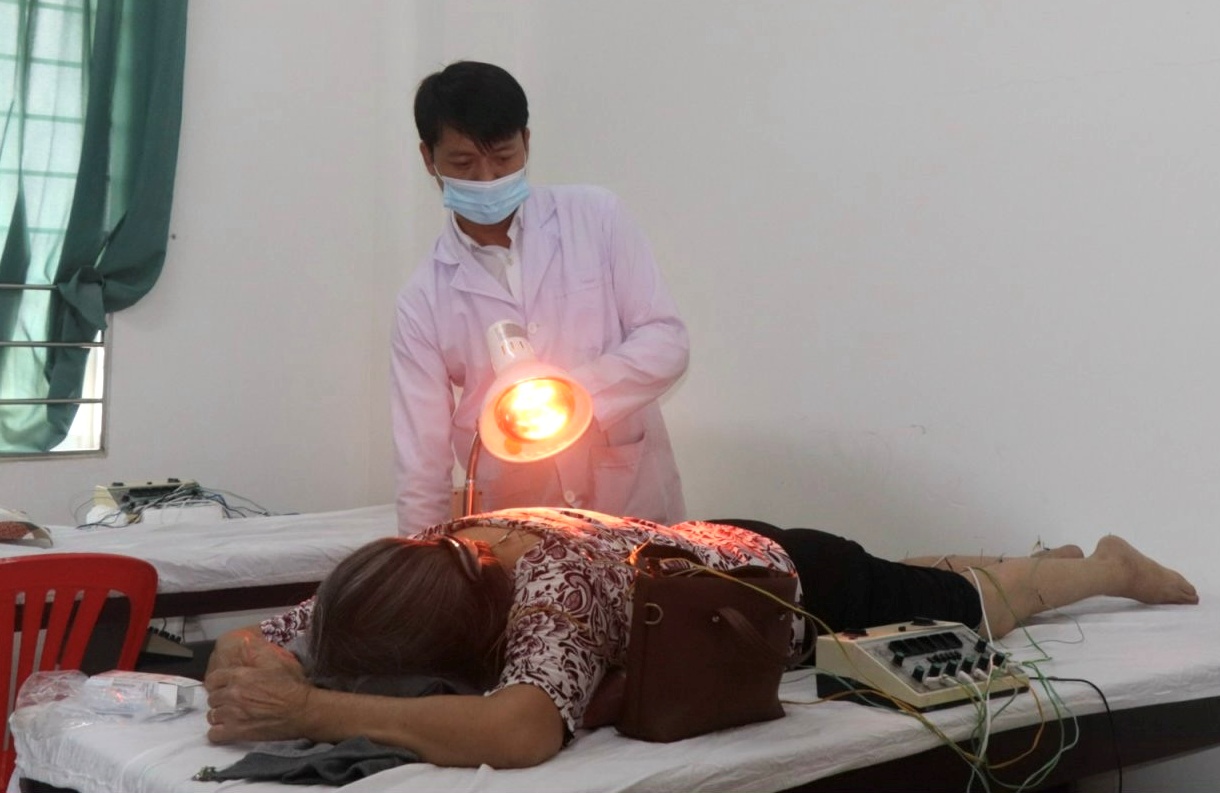Báo Bình Dương điện tử - www.baobinhduong.vn
Tổng Biên tập: LÊ MINH TÙNG
Phó Tổng Biên tập: HUỲNH MINH DÂN - NGUYỄN QUỐC LIÊM
Traditional medicine is a traditional method of treating diseases and forms the foundation of modern medicine. The development of traditional medicine not only contributes to the overall achievements of the provincial healthcare sector but also plays an important role in preserving the cultural identity of the nation.

The doctor at the Tan Uyen Medical Center treats patients using traditional medicine methods
Achieving significant results
At 7 a.m., the Traditional Medicine and Functional Restoration Department of Tan Uyen Health Center has already seen a significant number of patients seeking treatment using Traditional Medicine methods. At this time, the department is providing treatment for over 20 individuals with conditions such as peripheral neuropathy in the limbs, degenerative knee joints, degenerative spinal discs, and headaches. All hospital rooms are filled with patients. According to the doctors in the department, previously the practice of Traditional Medicine at the center was not well developed, but since the center invested in advanced equipment for examination and treatment, such as shortwave machines, spinal traction devices, and automated herbal medicine dispensers, it has attracted patients to seek medical consultation and treatment using traditional medicine. The center is classified as a third-tier technical facility, but with a modern machinery system and a team of competent medical doctors who are dedicated to their profession, it has achieved positive results in diagnosing and treating patients.
For over 2 months now, every day Mrs. Nguyen Thi Sanh, 65 years old), living in Uyen Hung ward, has been undergoing treatment for the sequelae of cerebral vascular accident, left hemiplegia. Today, she was discharged from the hospital by the doctor due to significant improvement in her condition. Mrs. Sanh said, "Half of my left side has reduced pain, I can stand up and walk without assistance, and my fingers are flexible enough to hold lightweight objects. The doctor advised me to continue with physical therapy and take medication to improve my health." Mrs. Phan Su from Hoi Nghia Ward shared: "This is my first time coming here for traditional medicine examination and treatment. Today is the fifth treatment day, and I can see significant improvement in my condition, much better than before. The doctors here are very enthusiastic and dedicated, providing me with advice on how to exercise at home and how to perform exercises here, so I feel very comfortable."
In an interview with us, Dr. Quach Trung Nguyen, Deputy Director of the Department of Health, stated: "The combination of Eastern and Western medicine is the application of both modern medicine and traditional medicine to treat patients. Modern medicine will play a role in clinical examination (ultrasound, X-ray, CT scanning) and then patients will be diagnosed and treated with traditional medicine, helping to enhance the safety and effectiveness of treatment using traditional medicine methods. For example, in the case of conditions such as sequelae of stroke, cerebral palsy, patients will be treated for the underlying cause of the disease according to modern medicine. Afterwards, they will be treated with traditional medicine techniques such as acupuncture, massage, acupressure, without the use of medication. This will help minimize the side effects of specific drugs and contribute to improving the quality of life for patients.”
Widespeading network
According to statistics, the province has 3 provincial-level traditional medicine healthcare facilities that provide diagnosis and treatment using traditional medicine. These include the Provincial Traditional Medicine Hospital, the Provincial General Hospital, and the Provincial Rehabilitation Hospital. The Provincial Traditional Medicine Hospital is a specialized hospital responsible for coordinating traditional medicine healthcare activities in the province. In addition, 100% of district, city, and provincial medical centers have departments and clinics for traditional medicine; 91.3% of commune health stations provide examination and treatment using traditional medicine. By 2023, the entire province will have 84 out of 91 communes meeting the advanced criteria for traditional medicine and is in the process of recognizing an additional 3 communes.
The traditional medicine service network in the private sector is also growing rapidly. The province has 7 general hospitals with traditional medicine departments, 62 general clinics with traditional medicine clinics, 61 specialized clinics for traditional medicine, and 79 traditional medicine treatment divisions. In the province, there are 1,389 establishments selling herbal medicines and traditional medicines; 12 wholesale companies selling medicinal herbs, traditional medicines, and 5 companies producing medicinal herbs, traditional medicines.
Currently, the provincial Traditional Medicine Hospital has a scale of 150 hospital beds, 13 departments, and rooms; the infrastructure is spacious and relatively complete with equipment to serve the examination and treatment using traditional medicine methods, combined with modern medicine. The hospital has a team of doctors with expertise in traditional medicine, and specialized medical equipment is ensured to serve and improve the quality of treatment for patients. However, currently, the hospital's medication procurement work is facing difficulties, leading to a lack of supply for medical examination and treatment activities. The utilization capacity of hospital beds in 2023 is only about 50%. Currently, the Traditional Medicine Hospital focuses only on specialties such as traditional medicine and functional rehabilitation, and has not been able to achieve the goal of striving to become a comprehensive traditional medicine hospital according to the standards of a second-class hospital.
Reported by Kim Ha – Translated by Vi Bao